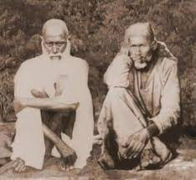By: M. Hidayatullah
(Former Chief Justice and Vice President of India)
 I am overwhelmed by the request to contribute an article on Sai Baba of Shirdi. The word ‘article’ is hardly appropriate for what I intend to say. In Urdu books, sometimes the expression sukhanhai- guftani (usually some words to say) is used. I am writing this in this sense. It is difficult to add anything to the accounts given by the devotees in this magazine. It is a complete picture of a life of piety, full of miracles and devotion, written with inspiration and care. I for one had not the good fortune to meet the saint but I often get the prasad through devotees who visit Shirdi. There can be no doubt that saints possess enormous spiritual powers which they receive from the Almighty.
I am overwhelmed by the request to contribute an article on Sai Baba of Shirdi. The word ‘article’ is hardly appropriate for what I intend to say. In Urdu books, sometimes the expression sukhanhai- guftani (usually some words to say) is used. I am writing this in this sense. It is difficult to add anything to the accounts given by the devotees in this magazine. It is a complete picture of a life of piety, full of miracles and devotion, written with inspiration and care. I for one had not the good fortune to meet the saint but I often get the prasad through devotees who visit Shirdi. There can be no doubt that saints possess enormous spiritual powers which they receive from the Almighty.
Our Holy Book, the Quran, mentions aulia (holy men) and charges us to ‘fear’ (respect) them. I have had some experiences as in Nagpur we had the well-known saint Tajuddin Baba whose maqbara got constructed by the Nizam through my father. He sent me a half-smoked bidi through one of his disciples who lived in the jungles of Mornala near Chhindwara. I was then 10 years old, and I was told by the messenger that would be my pen and I would ride an elephant. This incident is described in full by me in my memoirs My Own Boswell. From that day I have never looked back and have gone from strength to strength.
Another saint, Meher Baba, who kept silent for many years, also blessed me. Once, in Delhi, I presided over a meeting where devotees expressed their devotion to him. He was not present, and it seems that a tape of the proceedings was sent to him. I had spoken and, as was his practice, he wrote a message of one line. It read: “You will remember me on my birthday.” I could not understand it till his birthday came on the 25th of February and I was sworn in as the Chief Justice of India. I remembered his message and him. Often on the 25th of February, I remember him, and I am reminded of him on that day in some way or the other.
sent to him. I had spoken and, as was his practice, he wrote a message of one line. It read: “You will remember me on my birthday.” I could not understand it till his birthday came on the 25th of February and I was sworn in as the Chief Justice of India. I remembered his message and him. Often on the 25th of February, I remember him, and I am reminded of him on that day in some way or the other.
My father was City Magistrate in Nagpur and Tajuddin Baba was lodged in the Mental Hospital as he used to throw stones at the vast crowds which pestered him. Raja Bhosle then gave him shelter in his palace. Once, my father in the company of one Azam Shah, went to Shakardara where he was residing in a hut. My father related that he was seated with his eyes shut in a maraqba (contemplation of God). He gave my father and Raja Azam Shah two pieces of chappati lying there. My father ate it, but Azam Shah threw his piece behind his own back. Tajuddin Baba did not see this as his back was towards them, but he said: “You do not eat the bread given by a faquir. Now you won’t be able to eat your own bread.” From that day he had to be force-fed every day at every meal!

No wonder the Quran said: “Be afraid.” In Delhi, there is a maqbara of Hazrat Nijamuddin (R.A.). There is another of Hazrat Chisti at Agra and of Gharib Nawaz Mohiuddin at Ajmer. At the last place, I prayed that I might stand first in the examination, and I did. I had never stood first before that time. I hope Sai devotees will read this with devotion and belief and respect it. They will cover themselves with divine grace. I commend it to them and thank the devotees for the privilege of giving me a chance to pay this homage.
Before I leave this, I may recount an incident connected with Sai Baba. As a Judge of the Supreme Court, I tried the case of a Muslim butcher who made an appearance as the saint whom he resembled and collected money from the public. He would appear in an alcove dressed like him and the people would prostrate and give money. He was caught and received jail punishment. When his case came before me, a plea was made that the sentence should be reduced. I said of all the people a Muslim butcher should do this was outrageous and I was sorry that the Whipping Act had been repealed as the proper punishment was not jail but whipping!
(Bombay.16 May 1991)

Leave a Reply